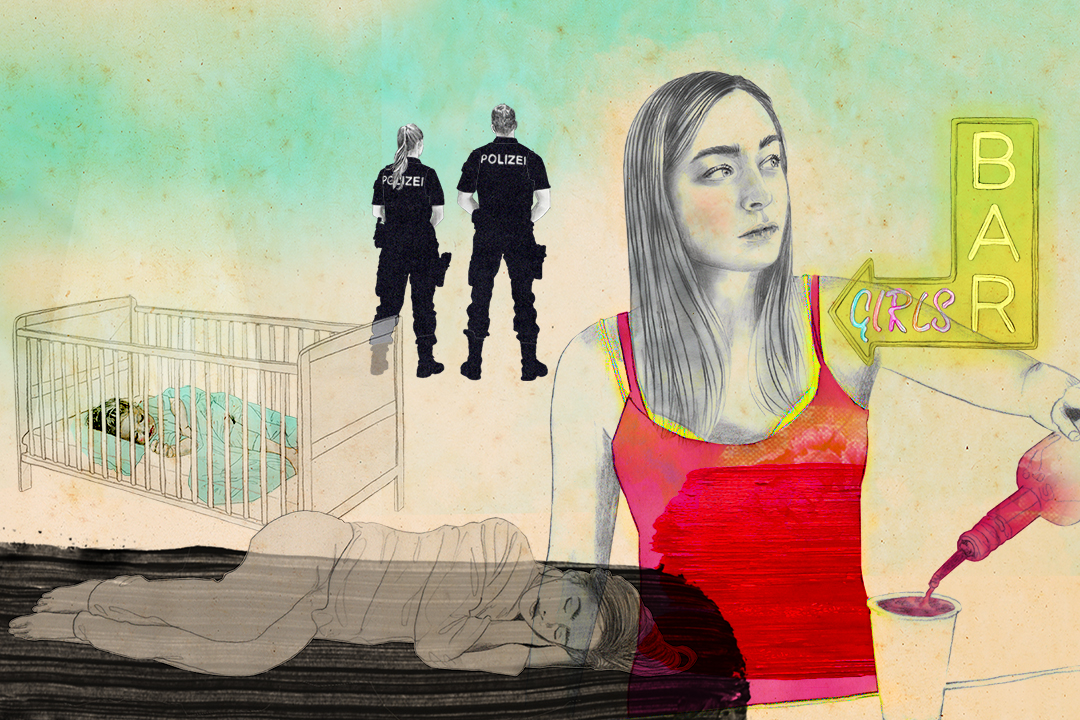
Nannies go through hell in Switzerland

Young Albanian women come to Switzerland because they want to look after babies – a nice job in a safe country. But many end up in the clutches of human traffickers. Part 1.
Investigation and text: Adelina Gashi, Marguerite Meyer. Investigative collaborator: Vladimir Karaj.
This investigation began more than ten months ago with an article in a Swiss regional newspaper: a young Albanian woman took her former employers to court. The 19-year-old had worked illegally as a nanny for a Swiss couple with three children under slave-like conditions: in addition to looking after the kids, she had to wash, cook and clean around the clock. Her wage? CHF300 ($340) a month – beatings included. Her passport was taken from her, to prevent her from running away. She did eventually.
The couple was found guilty of coercion, offences against the Foreign Nationals and Integration Act, and human trafficking. The last conviction is rare in Switzerland: on average just 80 cases are brought to court a year. We want to know more about the young woman. After several attempts she agrees to meet us.
The UN defines Human TraffickingExternal link as “the recruitment, transportation, transfer, harbouring or receipt of people through force, fraud or deception, with the aim of exploiting them for profit. Men, women, and children of all ages and from all backgrounds can become victims of this crime, which occurs in every region of the world. The traffickers often use violence or fraudulent employment agencies and fake promises of education and job opportunities to trick and coerce their victims”.
The vast majority of perpetrators are menExternal link. Women who become co-perpetrators have usually been previously exploited themselves.
We meet Lirije – as we call her for this report – in her lawyer’s office. She is 23 and still lives in the same city where she suffered so much. Going back to Albania is not an option. “I’m allowed to stay in Switzerland and am now looking for a flat,” Lirije says, smiling shyly. Soon she will be able to start an apprenticeship.
Lirije has a childlike face. The impression is deceptive – she is fiercer than she seems. Even though she often looks at her hands self-consciously when she talks about her youth.
Lirije runs off
Lirije grew up in a small town in rural Albania. After graduating from her local school, she helped her father with the small business and her mother with the housework. At weekends she met up with friends and cousins for a coffee or a fresh fruit juice in the town’s small nightlife street. The teenagers dreamed of a more exciting life – far away from their structurally weak hometown.
Their lack of perspectives typifies the general feeling of many young Albanians. A weak economyExternal link and disillusionment with politics drive tens of thousands of young peopleExternal link to Western Europe every year, where they often end up in low-paid jobs, working in nursing, catering or childcare. In many cases these are regular jobs. But not always, especially not in the nanny business, as we discovered.
For Lirije’s family, their daughter’s future does not lie abroad, but with a husband. Her own wishes – for an education, perhaps even a career – are of minor importance to her parents. And so, at 18, she married someone her family approved of. “He wasn’t a bad man, but I didn’t love him,” she says.
Being trapped in a loveless marriage and dependent on her husband’s income was an unsettling situation for Lirije. It was during this time that she heard about the nanny jobs abroad: three months of work, easy money, board and lodging provided.
A tempting prospect. Lirije searched for “nanny” and “Switzerland” on Instagram and quickly landed on a profile full of job ads. In Albanian they promised quick placement with Swiss families and a good salary. And so she secretly made a plan: to leave Albania.
She did not know Switzerland. But her hopes were high of getting an education there and finding her own flat and a partner she loves. What she did not expect was that her presumed ticket to freedom would turn out to be a nightmare. And that she would fall into the grip of traffickers.
“Human trafficking is modern slavery,” writes the Federal Office of Police (fedpol) on its website. And Lirije comes terribly close to the typical victimExternal link as described by fedpol.
Fake recruitment agency
Most women know it is not legal work, says journalist Iris Luarasi, an expert on women’s rights in Albania. “But if you’re sitting at home and don’t have any work, the prospect of a job as a nanny in Switzerland is pretty good.” Albanians are used to having to resort to illegal work to make ends meet, she explains. “Just because something doesn’t look quite legal doesn’t necessarily put them off or make them suspicious.”

Lirije had been recruited via social media. So we also log in to Facebook and Instagram – and quickly find what we are looking for. “Babysitters in Switzerland” is the name of the page. It is full of ads with pictures of cute children, teddy bears and balloons. One of them is looking for someone to take care of two children in Solothurn. Payment: CHF600 a month.
We find dozens of these accounts, each with thousands of followers. There are new posts every day. None of the pages are registered as professional placement agencies in Switzerland. Under the posts, women comment: “I like children and have childcare experience. Where can I apply?”
We realise that Lirije cannot be the only victim.
So we ask around. We dig through social media and court files. Over months we manage to track down several women who have had similar experiences.
Some want to tell us their story but are afraid. They still fear their abusers months later. Human trafficking is a complex web of psychological, physical and financial dependencies. The victims are ashamed of what they have been made to endure – and ashamed that they were deceived. We have therefore anonymised their names and details. Their stories reveal the system used by nanny traffickers operating out of Switzerland.
Shpresa knows nothing
In Tirana, the capital of Albania, we meet Klaudia for a coffee by the lake on a sunny afternoon. She is wearing a smart leather jacket with the sleeves rolled up and has a big smile. “I like coming here when I’m working from home,” she says. Today she has an office job, which she enjoys. Seven or eight years ago she was a nanny in Switzerland. And she was lucky. She was the only woman in our many months of investigation who had good things to say.
Klaudia had just finished her studies in Tirana and was waiting for a suitable job. By chance she saw an ad from a family from the central plateau region. “I was curious and wanted to see something abroad. I wrote, and two weeks later I travelled to Switzerland.” She stayed for three months. “The family took me on trips and showed me around Switzerland.” She got on well with the woman. They often drank coffee together or cooked an Albanian dish.
Still, she would no longer get involved in something like that today. “But back then, I was able to buy a car with the money I earned,” she says. Then she picks up her mobile phone and shows us pictures of a girl. “That’s the little one. She’s so cute.”
Klaudia’s host family had advertised on their own. In recent years the pages have become “professionalised” – as soon as there was money to be made. At first, interested women were asked to pay a commission, with which the fake agency supposedly vetted families. Nowadays, the women are asked to pay an advance for the journey, for papers and promised contracts. Just like in the legal economy, there are subcontractors: the passport forger, the travel guide. Meanwhile, ads for waitresses and dancers pop up, too. “I can bring you women from Bulgaria,” says one comment on such an ad.
“Dancer is the transitional job into the sex industry,” says Stephan Fuchs, who with Thomas Roth manages the organisation Trafficking.ch, which runs a shelter for victims. “Nannies are often forced into prostitution.”
There are several small groups in Switzerland who bring women into the country as nannies. The business does not yet appear to be in the hands of a single mafia organisation. That would be the next typical step in organised crime.
But Shpresa knew nothing of all of this. We learn about her case from a fellow journalist we had previously told about our project. “Hi. You’re investigating human trafficking involving Albanian nannies, aren’t you? We have a court case on the matter today,” she wrote to us on WhatsApp one morning.
Why can Shpresa not testify in Swiss court? And what happens to the perpetrators behind her case? Find out in part 2.
This investigation first appeared in the Swiss magazine “Beobachter”. It was made possible with the support of JournaFONDS and the Real 21 media fund.
An Albanian version is available on the investigative platform “Reporter.al”External link.
The German version is available on “Beobachter.chExternal link”.

In compliance with the JTI standards
More: SWI swissinfo.ch certified by the Journalism Trust Initiative




























You can find an overview of ongoing debates with our journalists here . Please join us!
If you want to start a conversation about a topic raised in this article or want to report factual errors, email us at english@swissinfo.ch.